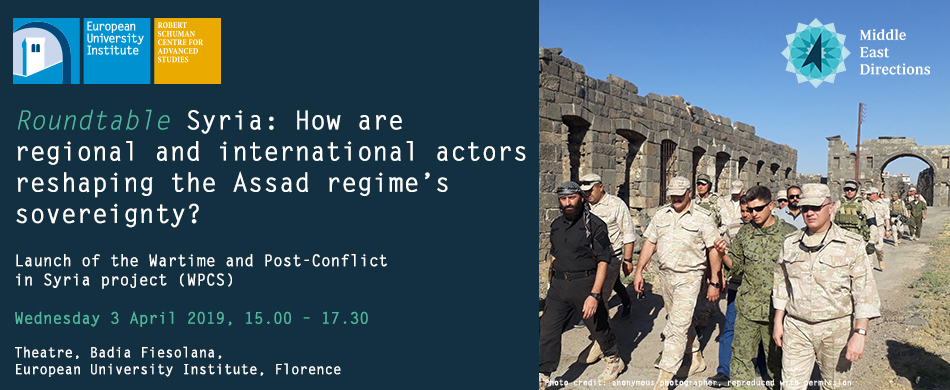Via della Badia dei Roccettini 9 50014 Fiesole
Opening remarks by Luigi Narbone, director, Middle East Direction Programme, RSCAS/EUI
Presentation of the WPCS project and the team by the project director Agnes Favier
The regional and international actors (both strong allies and rivals) involved in the war in Syria have significantly influenced the Syrian regime’s capacity to reassert its control over the country. While government forces have regained military control over most of the territory, to what extent are the political agendas and influence of external actors shaping the Syrian regime’s ability to regain its sovereignty over the country?
- Presentation 1. Asking Southern Syria’s Former Rebels: Is Russia a Reliable Actor in Syria? By Abdullah al-Jabassini
Abstract. In June 2018, the Syrian Arab Army and Russian air force launched a military campaign that aimed to end rebel rule and restore territorial control over the Daraa and Quneitra governorates in southern Syria. Soon afterwards, Russia brokered negotiations between the rebels and the Syrian government, which concluded with the rebels surrendering, marking an end to their rule in southern Syria. By means of extensive interviews with rebel and civilian actors, this study finds that rebel behaviour during the negotiation process influenced the privileges that they, and the civilians in their localities, could obtain in the post-surrender era.
Based on the findings of his recent working paper entitled ‘From Rebel Rule to a Post-Capitulation Era in Daraa, Southern Syria: The Impacts and Outcomes of Rebel Behaviour During Negotiations,’ the author will present an overview of the development of the surrender negotiations and highlight the list of unwritten promises that Russia vowed to fulfil. He will examine Russian efforts to accommodate former rebels in the 5th Assault Corps, a de facto Russian military unit within the ranks of the Syrian military which was established in 2016.
Abdullah Al-Jabassini is a PhD candidate in International Relations at the University of Kent in Brussels, Belgium, He is also a researcher at the Middle East Directions Programme at the Robert Schuman Centre for Advanced Studies.
- Presentation 2. Reshuffling the Cards in Northern Syria: Who Will be the Winners and the Losers? By Manhal Bareesh
Abstract. Large swathes of northern Syria have so far remained outside the military control of the Syrian regime and its allies. There are strong risks that the area will be the scene ofnew rounds of high-intensity confrontation in the near and medium term. More than elsewhere in Syria, interventions by regional and international actors are decisive in shaping the future of these strategic border areas with Turkey and Iraq. In the northwest region of Idlib, the September 2018 Sochi agreement, which was guaranteed by Russia and Turkey, has so far maintained a fragile status quo in the region. Further east in areas formerly controlled by Islamic State, US support for Kurdish forces was the main reason for the US-Turkey dispute.
Based on first-hand information and recently conducted field research, the author of ‘The Sochi agreement and the interests of guarantor states: Examining the aims and challenges of sustaining the deal’ research project report will address these issues. He will question the sustainability of the Sochi agreement in Idlib, the impact of the US decision to drastically decrease its military presence in Syria and Turkey’s ability to maintain a long-term influence over the Syrian territory. He will also analyse how the repositioning of foreign actors will impact the future of local actors in northern Syria.
Manhal Baresh is a Syrian journalist and researcher based in Turkey. His work focuses on the local and regional dynamics of the Syrian crisis, extensively investigating military mapping and armed groups in rebel-held areas, local councils and civil management. He is a regular contributor and commentator to Arabic newspapers and TV Channels.
Concluding remarks will be made by Steven Heydemann, RSCAS fellow at the EUI, non-resident senior fellow at The Brookings Institution, Janet Wright Ketcham, 1953 Professor in Middle East Studies and Director of Program in Middle East Studies at Smith College (MA, USA).
Open to EUI members. Chatham House rules.
A cocktail will follow the roundtable.




